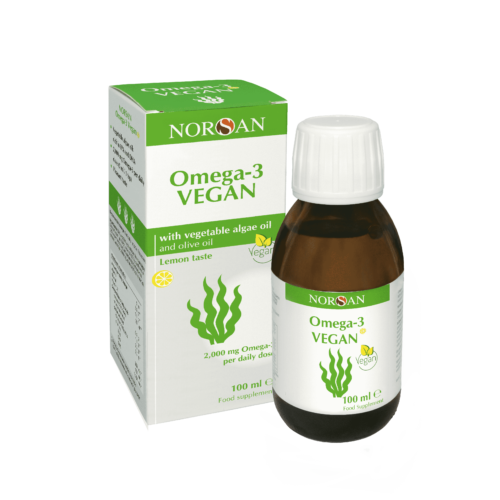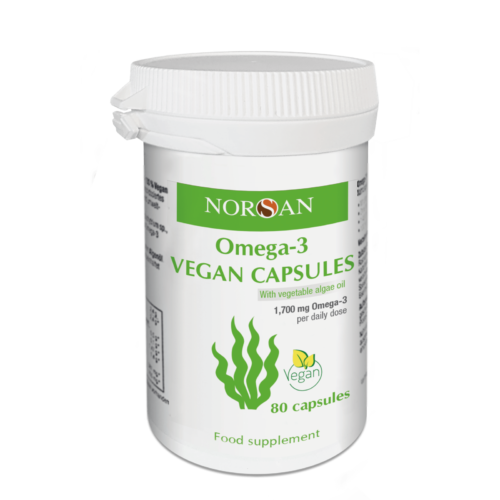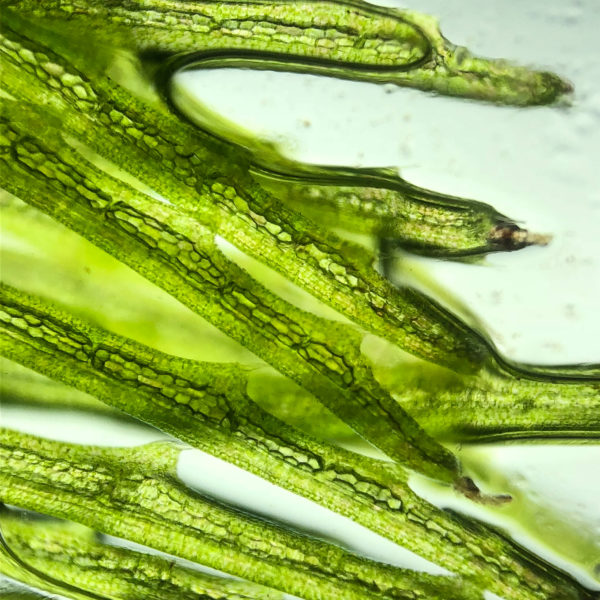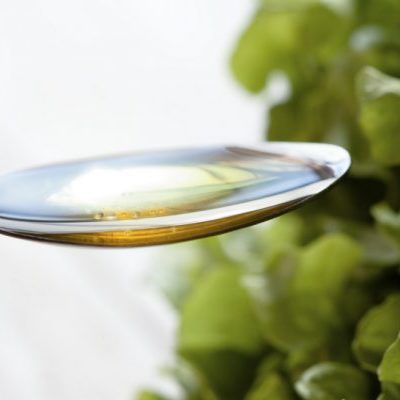The future is Algea oil
Omega-3 rich algea oil – 100% vegan
-

Omega-3 Vegan Oil
€29,00 (29,00 €/100 ml) 100 % vegan and without fish!-
- Vegatable algae oil: rich in EPA and DHA
- 2,000 mg of omega-3 per daily dose (1 teaspoon)
- Non-polluting and environment-friendly culture
- 800 IU vitamin D3 (vegan)
- Virgine organic olive oil as an antioxidant
- Pleasant lemon flavour(vegan)
-
-

Omega-3 Vegan Capsules
€29,00(33,03 €/100 g)100% vegan and free of fish!- With vegan seaweed oil
- 1.700 mg of omega-3 (EPA & DHA) per daily dose
- Environmentally friendly and non-polluting cultivated
- Now 80 instead of 60 capsules (25% more oil at 13% higher price)
- Rosemary extract as an antioxidant
- New capsule shell made from tapioca starch (without carrageenan)
- No reflux
- Perfect when travelling
-
Sale!

Omega-3 Vegan Oil + Capsules
Original price was: €58,00.€52,50Current price is: €52,50. (29,00 €/100 ml) 100 % vegan and without fish!-
- Combination package of Omega-3 Vegan oil (100ml) and Omega-3 Vegan Capsules (80cps)
- 10% price advantage
- Ideal if trying both product options
-
Vegetable omega-3 direct from the Source
Microalgae, with their unique photosynthesis, form the basis of our existence. They inhabit essential nutrients such as omega-3 fatty acids, which indirectly end up in our diet through fish and seafood. Algae or seaweed oil is such a good alternative to fish consumption. It allows us to go directly to the source!

Even though algae form an important basis in our food chain, we still know very little about them. This is changing rapidly with increasing research and development efforts. There exist estimated 1 million different algae species, so the research task is enormous and requires patience. The algae Chlorella and Spirulina have been known for some years, but these algae types have only an insignificant level of omega-3. With the discovery of the alga Schizochytrium we have an omega-3 rich algea available, which is a real alternative to fish consumption. It is expected that several algae species with high omega-3 content will be discovered in the future.
High-dose algae oil is not only a good alternative to fish consumption, but also perhaps the only way for a global supply of omega-3 fatty acids for the population. As we know, sustainable fisheries have their natural limitations. Cultivated algae, on the other hand, offer a sustainable alternative. Good for our health. Good for the oceans.
NORSAN Algea oil
NORSAN algae oil is extracted from the microalgae Schizochytrium sp. This type of algae consists of microscopically small single-celled algae. They are especially rich in the vegan omega-3 fatty acids DHA and EPA.

The alga is cultivated in artificial seawater and then fermented in an aqueous environment. The crude oil is extracted with the help of a centrifuge. The process is particularly gentle on the fatty acids. NORSAN algae oil is produced in an oxygen-free processing environment so that our oil is optimally protected against oxidation. Oxidation causes an unpleasant odour and negatively affects the taste. The oxidation value (TOTOX value) – also called the “freshness” value (the lower, the fresher) – is in the low range of 4 and thus illustrates the high freshness of the algae oil. Due to the cultivation of the algae, the algae oil is also very low in pollutants.
The production process of our seaweed oil is sustainable and environmentally friendly. The marine microalgae we use in Omega-3 Vegan are not sourced directly from the sea. They are grown in large containers in artificial seawater. This saves sea resources and preserves the food base for the fish. The fish also enrich their omega-3 content with algae. In this way, we do not interfere with the natural ecosystem of the sea, and the resources of fish and krill are saved.
WHAT IS THE DIFFERENCE to LINEseed OIL?

Picture will go our 2 columns
Both algae oil and linseed oil are plant sources of omega-3 fatty acids. However, linseed oil contains only alpha-linolenic acid (ALA), which is a precursor for EPA and DHA. The conversion of ALA into the more valuable EPA and DHA fatty acids takes place in the body only to a small extent. The regulation of an EPA/DHA deficit therefore does not succeed through the intake of linseed oil alone. In contrast, the “marine” omega-3 fatty acids EPA and DHA are found in some algae oils.
